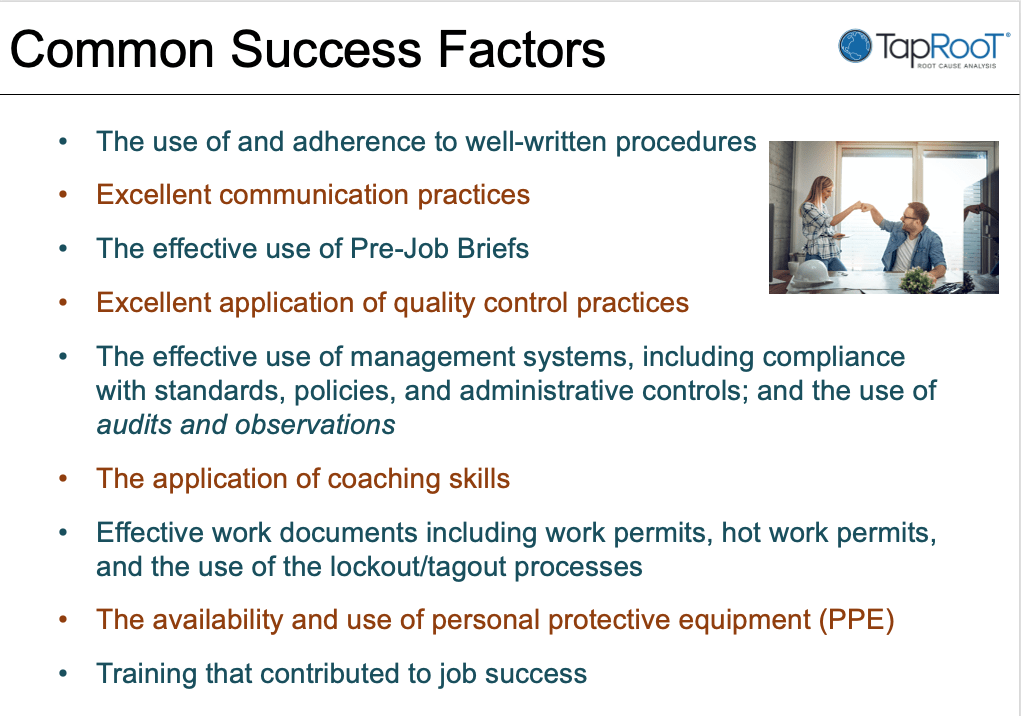How to Make a Job a Success [Common Success Factors]

Common Factors to Make a Job a Success
Have you ever thought about the common factors that make a job a success? When I was developing the Stopping Human Error Course, I went back to review several successful jobs from my days in the Nuclear Navy and came up with the list in the slide below…

What do you think? Did I miss anything? Do you see any of the items as unnecessary? Leave your comments below.
Opposite of the Root Cause Tree®
TapRooT® Users will quickly realize that the items listed are the opposite of the things on the backside of the Root Cause Tree®. The items on the backside of the Root Cause Tree® are root causes of failures – things you need to improve. If you improve them, you are most likely going to have success in the job you are performing.
Being Proactive
You don’t have to wait for accidents, project cost overruns, broken equipment, or complaints about quality to improve. You can be proactive and stop human errors before they happen. The slide above is from the NEW Stopping Human Error Course.
You can learn many techniques to achieve excellent human performance and then apply the ones that will help your company the most. (Don’t try to do everything at once – choose the techniques that will deliver the most ROI.)

What are the techniques we teach in the course? Review the following course outline and you will have an idea…
Course Outline
Day 1 (8:00am to 5:00pm)
- Foundations of Improving Human Performance
- Resilience and Safeguards
- Using TapRooT® Root Cause Analysis for Reactive Problem Analysis
- Using TapRooT® Human Performance Best Practices Proactively
- Human Engineering
- Procedures
- Training
- Communications
- Management System
- Work Direction
- Quality Control
- Stopping Normalization of Deviation
- Pre-Job Hazard Analysis
- Pre-Job Briefs
- Personal Safety Assessment
Day 2 (8:00am to 5:00pm)
- Applying Critical Human Action Profile Proactively
- Human Performance Improvement Technology
- Procedure Use/Adherence
- Place Keeping
- Independent Verification
- Three-Way Communication
- Pre-Job Brief
- Personal Safety Assessment
- Observation and Coaching
- Post-Job Brief
- Concurrent Verification
- Questioning Attitude
- Stop-Think-Act-Review
- Time Out
- Attention to Detail
- Management of Change
- Error Traps and Precursors
- Validate Assumptions
- Do Not Disturb Sign
- Conservative Decision Making
- Admiral Rickover and “Facing the Facts”
- Which Tools Will Work Best for You?
- Sample Plan/Suggested Plan
- Customizing Your Plan
- Present Your Plan, Benchmarking, and Feedback
With the exercises built-in to try the techniques, this is an active, quick-moving 2-day course.
When and Where are the Upcoming Courses?
The next course is in Knoxville, Tennessee on September 15-16, 2020. This course will be limited in size so if you want to make sure you save your seat, register today! Here is the link to register:
https://store.taproot.com/stopping-human-error-knoxville-tn-sep-15-2020
Read the Book
If you can’t make it to the course, you could order and read the book, Stopping Human Error by Mark Paradies. If you can make the course, you get the book with the course! Hope to see you at the course in Knoxville.




